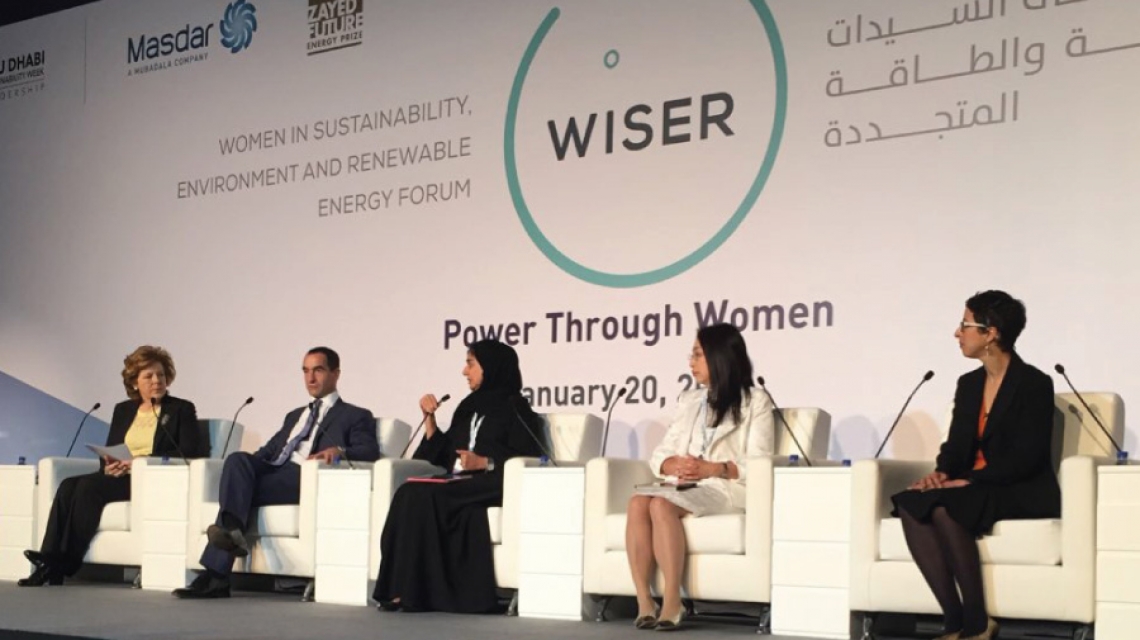
An important part of reducing carbon emissions to ‘decarbonize’ the world is developing the human and intellectual capital needed to develop and implement carbon-reducing innovations, Dr. Behjat Al Yousuf, Interim Provost of Masdar Institute, said at the Women in Sustainability, Environment and Renewable Energy (WiSER) Forum held last week during the Abu Dhabi Sustainability Week (ADSW).
Dr. Al Yousuf spoke on the “Towards De-Carbonization and Climate Resilience” panel at the event that brought together researchers, policymakers, industry leaders and others in the energy and environment sector to discuss the integral role research, human capital building and innovation can play in limiting global warming to below 2°Celsius above pre-industrial temperatures – the stated goal of the 2015 Paris Climate Conference (COP21).
She focused on how Masdar Institute is contributing to the UAE’s reduced carbon emissions and increased clean energy production targets through conducting cross-sector, multidisciplinary research projects and building a new generation of energy leaders.
“From the innovative, multidisciplinary research projects conducted by our faculty and students that produce novel, technological innovations in the critically needed areas of carbon capture and renewable energy production and storage, to the specialized training that produces high-caliber professionals with the skills needed to drive the UAE’s transformation into a low-carbon economy, Masdar Institute is providing the UAE with the tools needed to achieve greater sustainability and climate resilience,” Dr. A Yousuf shared.
Dr. Al Yousuf stated that increasing investment in the research areas of clean energy, carbon capture, energy efficient electronics, water and sustainable infrastructure is required if the world is going to reduce reliance on fossil fuels and decrease global carbon emissions. She emphasized that investment in both basic and applied research are needed to innovate in these critical sectors.
She also highlighted how Masdar Institute has partnered with Masdar and others to explore ways to create renewable energy-powered seawater desalination plants.
“The UAE’s energy-intensive natural gas-fueled water and energy cogeneration plants account for a third of the country’s carbon emissions. Thus, developing innovative water technologies that help to reduce emissions from the country’s desalination plants is critically needed to achieve a lower carbon footprint,” Dr. Al Yousuf said.
In addition to clean energy technologies, Masdar Institute’s leading official highlighted two other critical research areas that are needed to achieve global climate resilience: carbon capture utilization and storage (CCUS) and energy-efficiency in electronics and buildings.
Because fossil fuels will continue to play an integral role in the world’s economy and energy security, carbon capture technologies may play a pivotal role in the fight against climate change, which is why Masdar Institute is developing novel CCUS systems.
“Masdar Institute researchers are developing innovative carbon capture technologies that can capture carbon dioxide (CO2) that would otherwise be released into the atmosphere from fossil fuel-fired power plants and convert it into valuable, environmentally benign chemicals,” Dr. Al Yousuf explained. “This is just one example of how Masdar Institute is developing systems to make carbon capture technology more sustainable, energy-efficient and low-cost.”
A third research area Dr. Al Yousuf focused on was energy efficiency. Developing energy-efficient buildings and energy-efficiency in the electronics used by people that inhabit those buildings, will lead to significant reductions in energy use and carbon emissions around the world, the provost explained.
“At Masdar Institute, our faculty and students are working to develop sustainable infrastructure and energy efficient air-conditioning systems that could lead to massive reduction in electricity consumption. Air conditioning consumes up to 75% of the UAE’s electricity during peak hours in the summer, which places a heavy toll on the national power grid as well as the environment.”
Additionally, Masdar Institute researchers are working to make the electronic systems that run the world’s computers, phones, and high-tech industries, much more efficient, so that less energy is consumed by the machines that power our modern world.
Masdar Institute is engaged in over 50 cross-sector collaborative projects in the areas of clean energy, energy efficiency, CCUS, water, and other areas of strategic interest to the UAE. Through its several collaborative and use-inspired research projects, Masdar Institute is molding a new generation of highly-skilled energy leaders, Dr. Al Yousuf explained. “The human knowledge and human capacity Masdar Institute is building is the most important contribution we are making towards achieving the global goal of a low-carbon future.”
“Fostering the development of human capital is a key goal of Masdar Institute, and will enable UAE to transform its economy into a low-carbon, knowledge-based one,” Dr. Al Yousuf added.
Other panel members included Dayae Oudghiri, Management Board Member, Morocco Agency for Solar Energy; Michael Liebriech, Chairman, Bloomberg New Energy Finance (BNEF); and Yukari Niwa Yamashita, Board Member, The Institute of Energy Economics, Japan (IEEJ).
Erica Solomon
News and Features Writer
27 January 2016